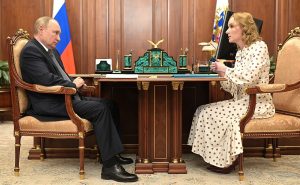Last week, the International Criminal Court issued arrest warrants for Russian President Vladimir Putin and Maria Lvova-Belova, Russia’s Commissioner for Children’s Rights, for their role in the alleged forced transfer of Ukrainian children back to Russia. Putin is the latest in a series of sitting heads of state to be issued an arrest warrant by the ICC since the Rome Statute came into force in 2002, including Omar al-Bashir, who was charged with several crimes, including genocide, in 2008.
Although the forced transfer of children is explicitly listed as one of the four examples of genocide in the Rome Statute and the UN Genocide Convention, neither Putin nor Lvova-Belova were indicted for genocide. What do the charges mean, and is there any likelihood that Putin or Lvova-Belova will face trial? We asked Dr. Joachim Savelsberg, Arsham and Charlotte Ohanessian Chair and Professor of Sociology at the University of Minnesota, what to make of the news.
The ICC alleges both Putin and Lvova-Belova are responsible for the war crime of unlawful deportation of a population (children) and that of unlawful transfer of a population (children) from occupied areas of Ukraine to the Russian Federation under the Rome Statute. The Rome Statute also refers to the forcible transfer of children under genocide. Why do you think the decision was made not to charge genocide?
Genocide is a very challenging charge for the prosecution. While the forcible transfer of children is one act that may constitute genocide (a condition that seems to be confirmed in this case), the prosecution needs to prove that it or other “acts [were] committed with intent to destroy, in whole or in part, a national, ethnical, racial or religious group.” To prove such intent is difficult. Generally, the ICC prosecutors have chosen the easiest way in this first step against Putin: the forcible transfer of children can be directly linked to him and his “Children’s Rights Commissioner.” Both have publically propagated this transfer and their intent. Command responsibility is most obvious here.

Several organizations and experts have indicated a high likelihood of genocide being committed by Russian forces in Ukraine. Do you envision a scenario in which Putin or another Russian agent is formally charged with genocide?
That is conceivable. In the case of Omar al-Bashir, then President of Sudan, the arrest warrant was first for war crimes and crimes against humanity. About one year later, he was also charged with the crime of genocide. The first charging decision was made against substantial resistance by various actors, including diplomats from influential countries. The genocide charge had to overcome even greater hurdles. In the case of Sudan, the Comprehensive Peace Agreement, in the works for many years and including a referendum of independence for South Sudan, with the intent to end a long civil war that had cost an estimated three million lives, seemed to be at stake, at least in the judgment of many diplomats (I wrote about this in detail in Representing Mass Violence: Conflicting Responses to Human Rights Violations in Darfur). In the current case as well, chances toward diplomatic negotiations with Putin to end the war seem diminished. They would be diminished even further if he was charged with genocide. Nonetheless, such charges might still be filed should Putin ever lose his grip on power and be ousted from the Presidency.
Like the United States, Russia is not a signatory to the Rome Statute after the investigation of Russian forces in Ukraine in 2016. What does this mean for the likelihood of an actual trial for Putin or Lvova-Belova?
Chances of a trial are currently slim. Should Putin travel to one of the 123 countries that have ratified the Rome Statute, they would be obliged to arrest him and extradite him to the ICC in The Hague. Other countries could do so. Yet, in the case of Sudan/Darfur, al-Bashir traveled to South Africa (a ratifying state), and the South African authorities did not arrest him. Parts of the S African state were close to doing so, but others allowed for his departure shortly before that arrest was supposed to occur. South Africa thereby offended against international law, a sign of its ambivalence vis-a-vis the ICC (shared with many African countries) and possibly of its desire to keep a-Bashir in the game for a potential peace process. Yet, should Putin be ousted, and should forces come to power in Russia that would benefit from Putin being tried, then such a trial might happen.

Comments